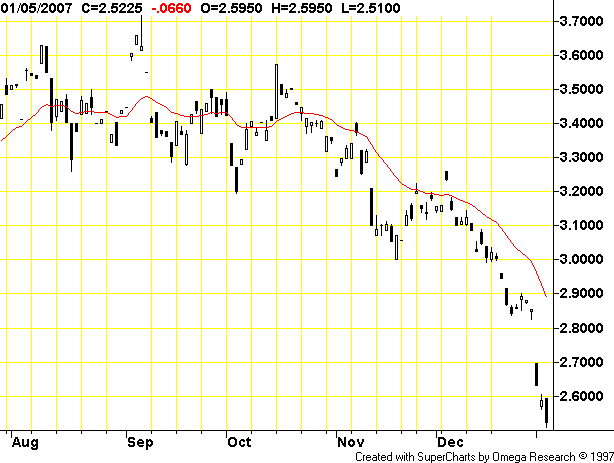By Bonddad
bonddad@prodigy.net
From CBS MarketWatch
A sell-off in commodities -- from copper to crude oil -- over the past few sessions is telling some veteran market watchers that a slowdown in economic growth, likely one of considerable magnitude, is already underway.
In the last two days alone, commodity prices seem to have fallen off a cliff. Copper futures, which tumbled 7.7% on Wednesday, fell another 1.8% on Thursday -- and have dropped 27% from their December highs.
Crude-oil prices fell nearly 5%, following a 4% drop in the previous session. The front-month futures contract was trading at its lowest level since June 2005. See Futures Movers.
Here's a daily copper chart. The price has gapped down and continued downward last week:
The reason copper is predictive?
Most commodities are used in the production of industrial goods. When producers start demanding fewer raw materials, it becomes noticeable in commodities prices much earlier than in official economic statistics, explained Barry Ritholtz, chief market strategist at Ritholtz Research & Analytics.
Copper, in particular, is often used as a reliable economic indicator because of its widespread use in production.
"Copper is the metal with a Ph. D. in economics," Ritholtz said. "It's used in the wiring of homes and offices, in plumbing in construction, and it's also a key component in electronic goods.
High stockpiles are one of the reason for the drop in copper prices:
Stockpiles of copper monitored by the LME have doubled since the start of last year. The exchange said earlier today copper stocks held in its warehouses had risen another 1,700 tonnes to total 194,875 tonnes
However it also reported that cancelled warrants, which represent warehouse stocks booked and due for delivery, have climbed to just over 17,000 tonnes, suggesting copper might soon start leaving LME warehouses
"With the large inflows of metal believed to be nearing an end, net falls in LME stocks could start to resume, which would support prices," said UBS Investment Bank analyst Robin Bhar
Simple supply and demand comes into play here. Higher supply = lower price.
Bloomberg has a bit more to flesh out the story:
Copper prices in New York had the biggest weekly decline in 10 years as slower U.S. economic growth and a building slump reduced demand for the metal used in homes, appliances and cars.
Global stockpiles are at the highest since June 2004. The U.S. economy grew at the slowest pace of 2006 in the third quarter, led by a decline in homebuilding. Builders are the biggest consumers of copper. Prices tumbled 12 percent this week, touching a nine-month low.
``I don't think anybody has predicted it would go this low,'' said Karen Poniachik, Chile's mining and energy minister and chairwoman of state-owned Codelco, the world's biggest copper producer.
According to Bloomberg, the slowdown in the US housing market is a prime reason for the drop:
Construction spending fell for a third month in November as homebuilding fell by 1.6 percent, the eighth-straight drop, the Commerce Department said this week. Fewer Americans signed contracts to buy previously owned homes in November, suggesting continuing weakness in the real estate, an industry group said yesterday.
``If overall housing sales stay slow, you could easily pare another 30 or 40 cents off of copper,'' Frank McGhee, head metals trader at Intergrated Brokerage Services Inc., said yesterday. ``Copper is a leading indicator. It's very sensitive to perceived economic conditions.''
Something to keep in mind is the futures markets have become the high tech market of the late 1990s. A ton of money flooded into the futures markets over the last 6 years. This is one of the reasons for the huge price run-ups over the same period. Increased demand = higher prices. Some of this selling may simply be people taking profits. In other words -- this could be speculators leaving the market.
However, the fundamentals indicates there may simply be weaker demand. Housing construction in the US is down. Overall stockpiles are up. This indicates copper production may be too high right now, anticipating a level of demand not warranted by the underlying economic fundamentals.

2 comments:
I read a very good news article today, and I'd love to point you to it but I closed the browser window, but it really put it into perspective. Copper prices were up over 400% from their lows, they had to be a price correction.
And I've done some analysis on valuation for a small copper producer and I used $2 in my calculations and it is still enormously profitable.
http://makingsenseofmyworld.blogspot.com/
The "correction" meme is being spread by the Fed.
I don't buy it.
Post a Comment